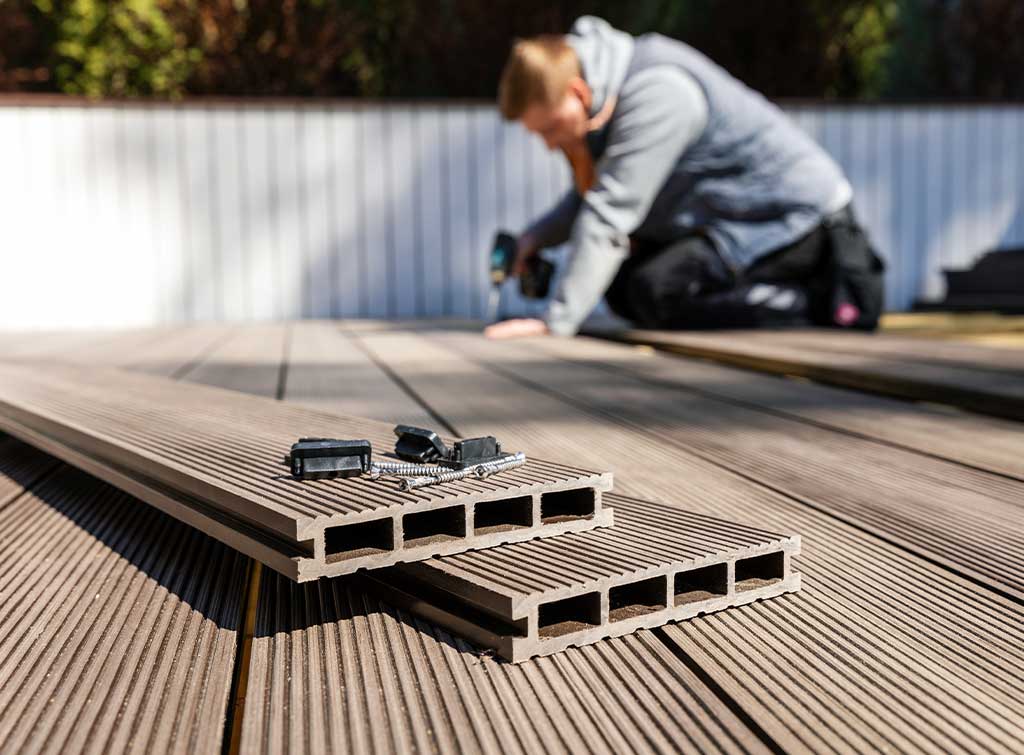Exactly how to Choose the Right Products for Your Deck Installation Project
Selecting the ideal materials for your deck installment task can appear challenging. The secret is to stabilize your spending plan, style preferences, and lifestyle requires to produce a deck that will certainly improve your outdoor room for years to come.
Comprehending the Various Sorts Of Deck Materials
When embarking on a deck setup task, the selection of materials comes to be a pivotal decision. Composite products, on the various other hand, are a blend of timber and plastic, providing durability and resistance to weather components. By comprehending these differences, homeowners can make a more enlightened choice on the most appropriate deck material for their particular requirements.
Evaluating the Resilience and Upkeep Demands of Deck Materials
Examining the resilience and upkeep needs of deck materials is an important step in deck installment. Toughness includes the material's capability to endure severe weather problems, wear and tear, and its long life.
Understanding maintenance needs is equally essential. Some materials need normal securing or tarnishing to maintain their look and withstand moisture damages, while others, like composite outdoor decking, demand less maintenance. By evaluating these variables, one can select the most suitable outdoor decking material, making sure an equilibrium in between longevity, upkeep requirements, and aesthetic allure.
Cost Analysis: Contrasting Wood and Compound Decking
Although price might at first look like an additional problem, it is a significant element when comparing timber and composite outdoor decking. Wood, normally a less costly choice, has a reduced in advance expense. Nevertheless, gradually, upkeep expenses can build up, possibly making timber much more costly in the future. These upkeep prices may include staining, securing, or changing harmed boards. On the other hand, composite outdoor decking, while pricier originally, requires less upkeep, possibly decreasing long-term costs. It's important to keep in mind that composite decking isn't impervious to wear and tear, and substitute prices can be high. Prospective deck owners need to consider their spending plan and desire to keep their decks when determining in between timber and composite decking.
Looks and Design Flexibility of Decking Products
While price is an essential factor to consider, the aesthetic charm and style versatility of outdoor decking materials additionally play a considerable function in the decision-making procedure. Different materials supply varying degrees of aesthetic charm. As an example, all-natural timber outdoor decking provides a timeless, timeless appearance, while composite products use a large range of colors and textures to match varied preferences and designs. Design versatility refers to the capacity to shape and control the outdoor decking material to satisfy specific layout needs. Timber, as an example, offers high style adaptability due to its ease of cutting and shaping. Composite materials, while much less versatile in layout, are still versatile sufficient for a lot of deck styles. These factors, for that reason, are critical components in the selection of outdoor decking material.
Environmental Impact of Decking Materials
When choosing outdoor decking materials, one need to take into consideration not just appearances and longevity, however additionally the environmental impact. It is essential to analyze the sustainability of products and check out recycled outdoor decking alternatives. Understanding the potential impact on local ecological communities will make certain an extra eco liable choice.
Examining Product Sustainability
In the realm of deck building and construction, evaluating material sustainability is a crucial step. This includes assessing the ecological effect of each potential product, taking into consideration aspects such as the power needed for its manufacturing, its carbon footprint, and its end-of-life disposal or recycling options. Wood is a sustainable resource, yet unsustainable logging methods can lead next to logging. Conversely, composite outdoor decking products often combine wood and plastic, reducing the need for new timber however increasing dependence on nonrenewable fuel sources. Light weight aluminum and various other metals may be more long lasting click now and recyclable, but their extraction and processing can be energy-intensive. Therefore, the choice of decking materials need to balance functionality, visual appeals, cost, and sustainability to guarantee a responsible and resilient setup.
Recycled Decking Alternatives

Compound decking is specifically prominent due to its longevity and simplicity of upkeep. Recycled plastic decking, on the other hand, is very resilient and needs marginal upkeep.

Effect On Local Ecological Communities
While the advantages of utilizing recycled materials for outdoor decking can not be overemphasized, it's equally vital to think about the broader ecological implications of these selections. The extraction, processing, and transport of materials can exceptionally impact neighborhood ecosystems. Deforestation for hardwood decking adds to environment loss and environment adjustment. Also the manufacturing of composite products can launch hazardous exhausts. Alternatively, using recycled or sustainably sourced products can assist mitigate these results. Taking into consideration the lifespan of materials can reduce ecological effect; longer-lasting choices require much less frequent replacement, therefore preserving sources. Appropriate disposal of old decking is crucial to reducing land fill waste. Essentially, an eco-conscious deck job needs careful material choice, sustainable sourcing, and accountable disposal.
Making Your Final Choice: Tips for Picking the very best Deck Products
As the short article transitions right into the subtopic of "Making Your Final Decision: Tips for discover this Choosing the most effective Deck Products", it is vital to comprehend the range of deck materials available. Striking a balance between durability and appearance is important in this selection procedure. The complying with discussion will guide visitors in making an enlightened choice based upon these essential considerations.
Understanding Various Deck Materials
The task of selecting the right products for your deck installment can seem discouraging due to the vast variety of choices available. Plastic or PVC decks are even a lot more sturdy and need much less upkeep than composite products, but they can look less all-natural. Light weight aluminum decks are strong, light-weight, and immune to rot, yet they are also the most expensive option.
Sturdiness vs. Looks Equilibrium
Stabilizing toughness with looks can be a difficulty when selecting deck materials. The choice typically boils down to individual choices and the deck's intended usage. High-traffic areas might require durable materials like composite decking, which withstands deterioration however might do not have the all-natural charm of wood. On the other hand, wood uses a timeless charm and heat that synthetic products battle to replicate. It needs extra maintenance and might not last as long. Homeowners require to strike an equilibrium, considering both the deck's sensible needs and their aesthetic choices. By doing so, they can guarantee their deck stays a useful and attractive outside space for several years to come.
Final thought
To conclude, selecting the appropriate products for your deck installment project needs mindful consideration of factors such as sturdiness, maintenance, cost, aesthetic appeals, and ecological effect. Whether you choose traditional wood or composite products, your option must line up with your spending plan, layout choices, and way of life. Ultimately, the very best outdoor decking material is one that boosts your outdoor space and gives enjoyment for years ahead.